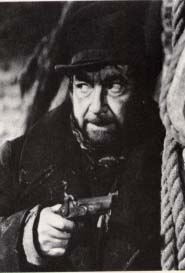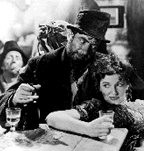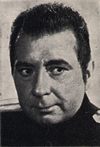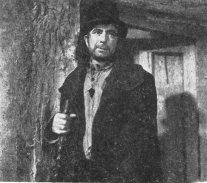![]()

www.robertnewton.net
<< continued from previous page
![]() tribute in the Around the World in 80 Days Almanac
described Robert Newton as "gifted," "sensitive,"
"warm-hearted," and "rebellious." "He was a nonconformist,"
it says, "his own man on and off the stage." In his book Bring
on the Empty Horses, David
Niven describes his friend "Bobbie" as "a brilliant
actor" and "a highly intelligent, erudite, kindly, and knowledgeable
man." He had a disrespect for petty authority and arrogance and an
outrageously off-beat sense of humor, yet he took his work seriously,
having a tendency to live his roles (sometimes publicly) when not performing
them on stage or screen. "Take care of your work first. Everything else
will be taken care of," was his philosophy, according to his High and
Mighty costar/roommate Robert Stack. In his spare time, he enjoyed
fishing, shooting, reading, walking, and cooking.
tribute in the Around the World in 80 Days Almanac
described Robert Newton as "gifted," "sensitive,"
"warm-hearted," and "rebellious." "He was a nonconformist,"
it says, "his own man on and off the stage." In his book Bring
on the Empty Horses, David
Niven describes his friend "Bobbie" as "a brilliant
actor" and "a highly intelligent, erudite, kindly, and knowledgeable
man." He had a disrespect for petty authority and arrogance and an
outrageously off-beat sense of humor, yet he took his work seriously,
having a tendency to live his roles (sometimes publicly) when not performing
them on stage or screen. "Take care of your work first. Everything else
will be taken care of," was his philosophy, according to his High and
Mighty costar/roommate Robert Stack. In his spare time, he enjoyed
fishing, shooting, reading, walking, and cooking.
Sadly, Newton's career was hampered by alcoholism. His reputation for drinking and unreliability eventually caused many directors trepidation in hiring him.
 In
1948, director David Lean found it a struggle to keep Newton's urge to
overact in check in Oliver Twist, but, thus reined in, Newton's
zeal resulted in what was probably the actor's second most memorable film
role. Ironically, Lean, who was known for his puritanical attitude towards
drinking and dislike of actors in general, had worked with Newton before
in This Happy Breed (the actor's first color film) and Major
Barbara and was quite fond of him. He once said:
In
1948, director David Lean found it a struggle to keep Newton's urge to
overact in check in Oliver Twist, but, thus reined in, Newton's
zeal resulted in what was probably the actor's second most memorable film
role. Ironically, Lean, who was known for his puritanical attitude towards
drinking and dislike of actors in general, had worked with Newton before
in This Happy Breed (the actor's first color film) and Major
Barbara and was quite fond of him. He once said:
I had a great weakness for Bobbie Newton. He used to drink far too much. And when he had a couple of drinks, he would speak the absolute truth, which could be horrifying. I remember him talking to a friend of mine after lunch, when he'd had a couple of drinks, and he leaned across the table and said, "Now I'm going to tell you about you." And he did, bang, on the dot, you know. Withering. He could be cruel, but what he said was undeniably true. I loved him.
David Niven also said of Newton's drinking:
With just the right amount on board he could be fascinating ... but once he had taken the extra one ... he changed gear and became anything from unpredictable to a downright menace. ... His wife [and friends] tried loyally and desperately to help him ... but his charm was so great and, when he took only a couple of drinks, his entertainment value was so spectacular that there was always some idiot who would press him to take the fatal third and fourth.
 Melvyn
Bragg points out other likely contributing factors in his biography of
another famous drinker, Richard Burton: A Life: "Alcoholism
was then barely acknowledged and certainly not a widespread and alarming
medical issue." Later, speaking of Newton, he adds, "It was
a time when drink proved not only machismo but independence and a contempt
for the opinion of the world--two of the qualities most longed for by
actors in their perpetual bondage to the four thongs of the telephone,
the contract, the reviews, the applause. Drink was a sovereign unto its
own. At that court Newton for a time was King."
Melvyn
Bragg points out other likely contributing factors in his biography of
another famous drinker, Richard Burton: A Life: "Alcoholism
was then barely acknowledged and certainly not a widespread and alarming
medical issue." Later, speaking of Newton, he adds, "It was
a time when drink proved not only machismo but independence and a contempt
for the opinion of the world--two of the qualities most longed for by
actors in their perpetual bondage to the four thongs of the telephone,
the contract, the reviews, the applause. Drink was a sovereign unto its
own. At that court Newton for a time was King."
Newton's Obsession costar, Phil Brown, remembers, "... when I was working with him, he was off the booze and ... felt that he was uninteresting when he was off the booze. ... He was a charming man though."
 Richard Burton said of his friend, "I've told him. We've all told
him. If he doesn't lay off, it'll kill him." And Deborah Kerr once
said, "He was a very dear man, and it was a great tragedy that in
the end he destroyed himself through his increasing dependence on alcohol."
Richard Burton said of his friend, "I've told him. We've all told
him. If he doesn't lay off, it'll kill him." And Deborah Kerr once
said, "He was a very dear man, and it was a great tragedy that in
the end he destroyed himself through his increasing dependence on alcohol."
In 1955, Newton took on his final role, as the Scotland Yard detective Inspector Fix in the Academy Award-winning Around the World in Eighty Days. David Niven, who plays Phileas Fogg in the film, recalls working with his friend and shares these personal insights about him in the book The Moon's a Balloon:
The Mexican bullfighter-comedian Cantinflas arrived to play my valet, Passepartout, and Shirley MacLaine was signed to play Princess Aouda.On March 25, 1956, Robert Newton died in the arms of his wife Vera at the age of 50. The official cause was a heart attack. Vera, who died in 2000, and her late husband were memorialized by their son, Kim, at Westwood Memorial Park in Los Angeles."But who the hell do we get to play Mr. Fix, the detective?" said [director Mike] Todd, chomping on the inevitable cigar.
"How about Robert Newton?" I suggested. Todd was enchanted with the idea and immediately put in a call.
"But I warn you, Mike," I said, feeling every kind of heel, "Bobbie is a great friend of mine, but he does drink a lot these days and you must protect yourself. Lots of people are scared to employ him--he disappears."
"I want to see Newton," said Todd firmly, "and when he comes in, I want you here in the office."
"For Christ's sake, don't tell him I said anything," I begged. "He'll never forgive me."
A little later, Bobbie Newton shuffled in. I hadn't seen him for some weeks, and it was obvious that he had been on a bender of heroic proportions.
Todd went into his routine. "Ever heard of Jules Verne?"
"Ah, dear fellow," said Newton, "what a scribe!"
"Eighty Days Around the World?"
"A glorious piece, old cock."
"How'd you like to play Mr. Fix?"
"A splendid role," said Bobbie, rolling his eyes. "Do I understand you are offering it to me, dear boy?"
"I might," said Todd, and I felt like the slimiest worm when he continued, "but your pal, Niven, here says you're a lush."
"Aah!" said Newton. "My pal, Niven, is a master of the understatement."
He was immediately hired and gave his word of honor to Todd that he would go on the wagon for the duration of the picture. He stuck manfully to his promise.
On location at Durango, Colorado, Bobbie and I went off every evening after shooting to catch big, fighting rainbow trout in the mountain lakes. One cold autumn sunset, with streaks of blue woodsmoke clinging to the surface of the water and the last rays falling on the glorious colors of the aspens and beeches, Bobbie confessed to me that his promise to Todd had not really been all that difficult to give because that very morning his doctor had warned him that one more session with the bottle would almost certainly be fatal. Two weeks after we finished the picture, Todd called some of us back for an added scene on a ship. Bobbie Newton was required for only one day, but when he arrived for work, a roaring delivery of "Once more unto the breach . . ." announced alarming news. "Oh, Bobbie," I said, "what have you done to yourself?"
He put his arm around my neck and tears rolled down his swollen cheeks. "Don't chide me, dear fellow, please don't chide me," he said.
Within a very few days, the doctor's warning to that warmhearted, talented and wonderful soul proved tragically correct.
